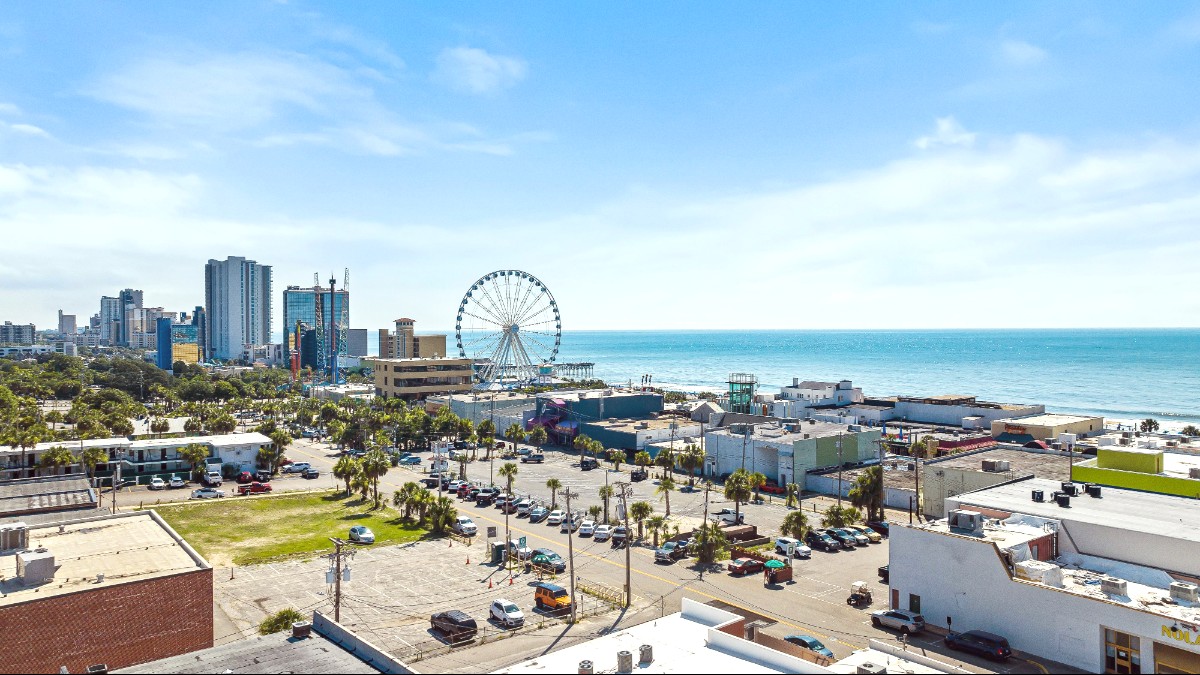
South Carolina, USA
Climate Patterns Throughout the Year: The area sees warm to hot conditions. Summer (June - August) presents high temperatures and humidity, ideal for water activities. Fall (September - November) offers pleasant weather with less humidity, good for outdoor pursuits. Winters (December - February) are mild, with fewer crowds. Spring (March - May) transitions to warmth with low humidity, ideal for blooming landscapes.
Season Analysis: The high season aligns with summer, drawing peak crowds. Shoulder seasons (spring/fall) present a balance of good weather and fewer visitors. The low season during winter offers significant value with quiet surroundings.
Hurricane Season: The Atlantic hurricane season lasts from June 1 to November 30. Peak activity typically occurs from mid-August to late October. While direct hurricane hits are infrequent, tropical storms can cause heavy rainfall, strong winds, and coastal flooding. These events may lead to evacuations and travel disruptions.
Extreme Temperatures: Summer months can see heat index values exceed 100°F (38°C) due to high temperatures and humidity. Take precautions against heat exhaustion.
June - August
Warmest beach weather, full attraction hours, lively environment, many events.
Crowded beaches/attractions, highest prices, heavy traffic, intense humidity.
April - May, September - October
Pleasant weather, fewer crowds, lower prices, ocean swim-friendly (early fall).
Early spring cool for swimming. Some seasonal attractions close late fall. Hurricane season extends into fall.
November - March
Lowest prices for lodging/flights. Very few crowds. Mild temperatures for golf/sightseeing.
Often too cool for ocean swimming. Many seasonal attractions closed or limited hours. Fewer large events.
Match your visit to Myrtle Beach with your preferred activities. Optimal periods for specific interests maximize enjoyment and comfort during your trip.
Certain seasons bring specific benefits for beachgoers, golfers, and those pursuing outdoor explorations. Festivals also often occur during select months.
June to early September (warmest ocean).
Spring (March-May) & Fall (September-November).
Spring & Fall (pleasant trail/park exploring).
Peak activity in Spring & Fall.
Winter (December-February, excluding holidays).
Travelers visiting Myrtle Beach enter the United States. Entry requirements stand uniform across all U.S. Ports of entry. Address these requirements before your trip to avoid issues.
Understand the appropriate visa for your travel purpose. Eligibility varies by country of citizenship.
Prepare for inspection upon arrival. Required documents confirm your travel purpose and financial capacity.
Familiarity with local emergency contacts proves helpful in unexpected situations.
Myrtle Beach presents travel options for nearly any budget.
The official currency is the United States Dollar (USD or $). ATMs appear widely available for cash withdrawals. Major credit cards (Visa, Mastercard, American Express, Discover) find acceptance almost everywhere, including restaurants, shops, and attractions.
Currency exchange services are less common outside of major airports or large banks. Often, withdrawing cash from ATMs or using credit cards for purchases presents a more cost-effective approach. Inform your bank of your travel dates to avoid any fraud alerts on your cards.
Daily costs range from $80 - $150. Stay in motels, shared rentals, or campgrounds. Meals involve fast food or self-catering. Transit: bus, walking.
Significant savings on accommodation and dining.
Limited options for high-end dining or exclusive tours.
Daily costs from $190 - $350. Stay in mid-range hotels/condos. Enjoy sit-down restaurants. Transit: ride-share, rental car share.
Good balance of comfort and experiences.
Some activities may exceed budget without careful planning.
Daily costs from $350 - $950+. Stay in luxury resorts/private homes. Fine dining and private transport. Exclusive tours.
Premium experiences and ultimate comfort at every turn.
Higher costs overall, though value for money remains apparent.
| Category | Budget | Mid-Range | Luxury |
|---|---|---|---|
| Accommodations | $40 - $100 | $80 - $250 | $150 - $1000+ |
| Meals (per person) | $10 - $20 | $20 - $40 | $40 - $80+ |
| Transportation (daily) | $5 - $10 | $15 - $50 | $50 - $100+ |
Prioritize your health and safety when visiting Myrtle Beach.
Routine vaccinations are current. No specific entry requirements from most countries.
Use Broad-spectrum sunscreen SPF 30+, reapply often. Drink plenty of water. Carry a Reusable water bottle.
Use Insect repellent, especially near marshy areas or at dusk.
Access to Healthcare
Healthcare and emergency services stand readily available. Dial 911 for immediate police, fire, or medical emergencies.
Several hospitals serve the area, along with numerous walk-in urgent care clinics for non-life-threatening conditions. Major pharmacy chains are widely available for prescriptions and over-the-counter medications.
Drinking water in Myrtle Beach and across the U.S. Remains safe to drink. Food safety standards are high in local establishments.
Myrtle Beach is generally safe. Petty crime (theft) may occur in crowded areas. Be aware of surroundings, especially at night.
Hurricane season (June-Nov) presents a risk. Monitor local forecasts and heed evacuation orders. Summer thunderstorms bring lightning; seek indoor shelter.
Strong currents can pull swimmers offshore. Swim near lifeguards. If caught, swim parallel to shore to escape, then return to shore.
Consider travel insurance for all travelers.
While Myrtle Beach remains a safe tourist destination, awareness and preparation enhance your visit.
Maintain awareness in busy tourist zones like Broadway at the Beach or the Boardwalk; petty theft can occur.
During summer, prolonged exposure to sun and humidity may lead to heat exhaustion. Seek shade and hydrate.
Heed all local warnings and evacuation orders during tropical storm or hurricane threats. Local authorities disseminate clear instructions.